Discover Ibiti and experience nature like you've never imagined
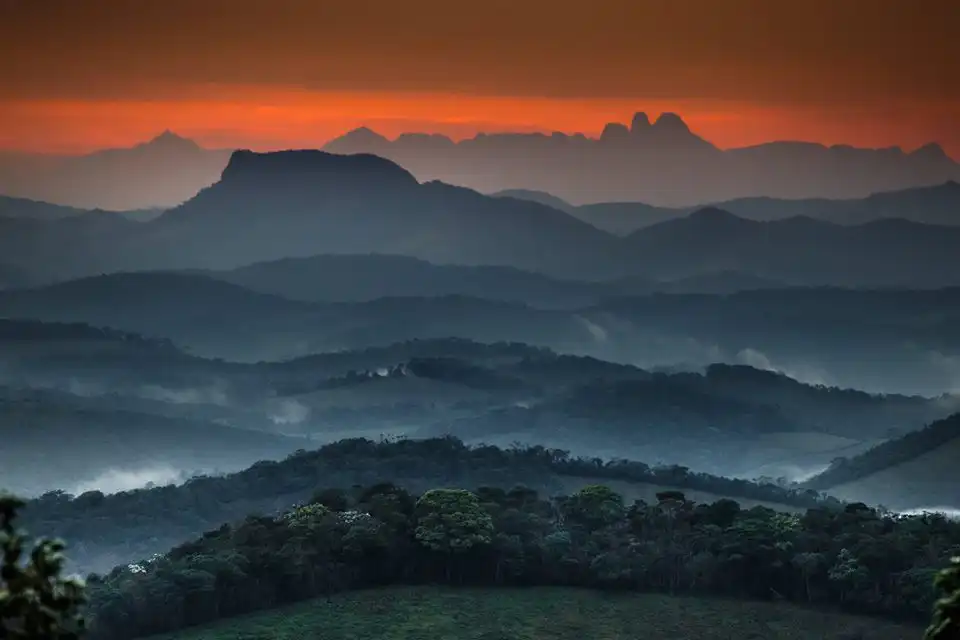
On the edge of the Ibitipoca State Park in Minas Gerais, there is a place that is not just a destination for regenerative tourism with luxury accommodation. Ibiti is a 6,000-hectare socio-environmental project that brings together the regeneration of the Atlantic Forest, exclusive sensory experiences, art, science and its own way of living and celebrating, in the time of nature. Here, former grazing areas have given way to living forests. And each experience stems from the same question: how can we live better, with less impact and more meaning? Art that touches the sky High up in the mountains, monumental sculptures created for the Burning Man Festival in California come to life in dialog with the landscape of Minas Gerais. The setting is ideal for sky watching, intimate programs such as meditation and sound healing, bike or horseback riding, picnics with groups of friends and family or even celebrating a special date in total privacy. Gastronomy from the land With more than 100 varieties of organic food grown by Ibiti Gaia within its own territory, Ibiti practices the concept of garden to table on a daily basis. What arrives on the plate is born there, respecting the soil, the weather and those who produce it. Music in the village At dusk, a 19th century piano echoes in the Gaia Café, in a small mining village called Mogol. There's no rush. No excess. Just music, scenery and the rare feeling that time has stopped so you can listen. Muriquis: science, courage and hope Ibiti is home to one of the most important projects in the world for the conservation of muriquis, the largest primates in the Americas and critically endangered. This is an unprecedented effort that combines science, cutting-edge research, care and long-term commitment. Personalized programs that connect to your essence From the first rays of the sun to nightfall, Ibiti invites you to experience nature at every pace in itineraries developed exclusively for you and whoever else is by your side: bike rides along trails, waterfall baths, special therapies in the spas, with heated pools, outdoor baths, art scattered across the landscape and viewpoints for sunrise and sunset, as well as stargazing. There is also a school, oca, orchard, nursery, café, restaurant, cinema, freshwater beach, lake and much more. Families, children, couples, singles... Everyone is very welcome to visit this “portal of possibilities”. Ibiti has hosted the Sertões MTB Ibitipoca for five consecutive years. It is also home to Muriqui Sounds - a music, art and gastronomy event at the Statues, which will be held for the fifth time in 2026. The Ibiti way of being We often say that Ibiti is almost a country, with its own way of being, thinking and speaking. Here, Portuguese and English mix with an accent full of mineirice. Classical philosophy coexists with community knowledge. Entrepreneurship goes hand in hand with local traditions. At Ibiti, you learn from the past, celebrate the present and reimagine the future. Sleeping is also an experience The types of accommodation reflect different ways of relating to Ibiti Engenho Lodge - an elegant farmhouseVillage - comfortable houses integrated into the village and local lifeRemote - quiet refuges in total connection with natureOca - built by indigenous people from the Xingu, it welcomes groupsGlamping - comfort under a starry sky Worldwide recognition Ibiti shows that it is possible to combine excellence, comfort, culture and real positive impact Sistema B - since 2017 Robb Report 2023 - among the 50 best hotels in the world Condé Nast Johansens 2024/2025/2026 - Excellence in sustainability The Long Run - tourism with purposeWhere it is On the edge of Ibitipoca State ParkLima Duarte - MGHow to get there - Exclusive SP-Ibiti flights on Ibiti's private landing strip Projetoflyflapper.com- Exclusive helipads- By car: access via the LMG-871 highway Find out more ibiti.com @ibitiprojeto @ibiti.village @ibitiengenho Reservations (32) 98449-2200 (32) 99984-7626 IBITI A place to feel and leave different
Ibiti regenerates more than 1,200 hectares of Atlantic Forest
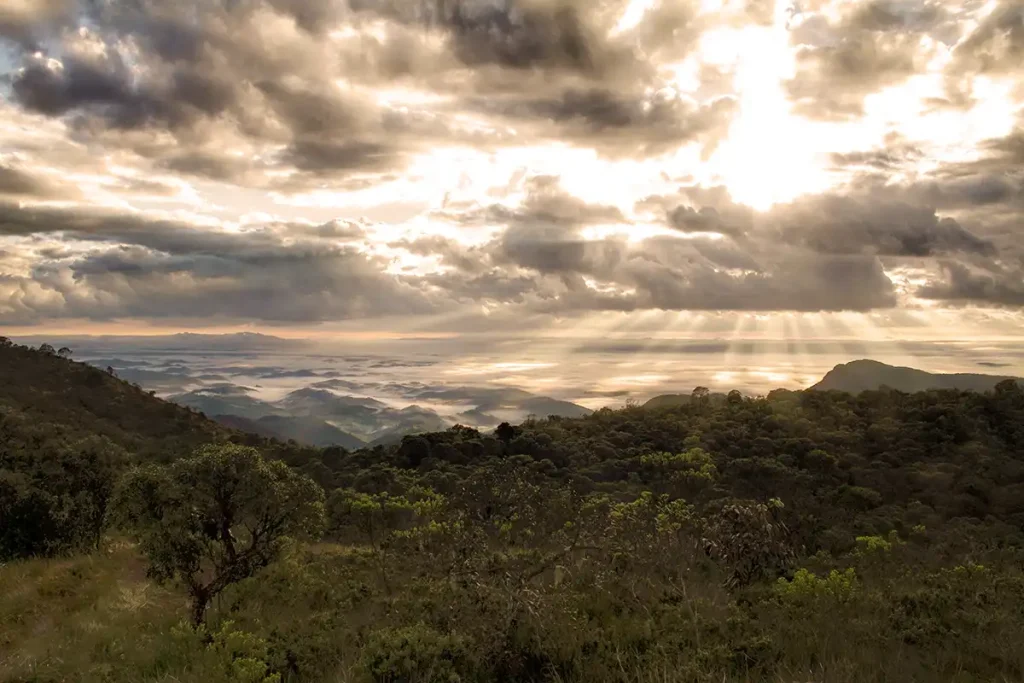
For centuries, the Atlantic Forest has been pressured by human occupation, livestock farming and monocultures. Around Ibitipoca it was no different: pastures replaced the forest and with them came the isolation of the fragments and the loss of biodiversity. But where many saw degradation and abandonment, Ibiti Projeto decided to bet on nature's time. And with that, it promoted a silent revolution. Forty years on, the results are there for all to see. The inhabitants of the region recognize the fruits of this work in the reinvigorated landscape. This perception is now backed up by the figures in the technical report “Temporal analysis to characterize land use and vegetation cover”, based on images from the Sentinel 2 satellite. The document from Bioflore, a company specializing in environmental monitoring, commissioned by Ibiti, revealed that more than 1,200 hectares of new forest have grown in the territory, equivalent to almost the size of the entire Ibitipoca State Park (1,488 hectares). These figures are the effects of an innovative conservation proposal, in the view of Heitor Filpi, CEO and co-founder of Bioflore. “From the point of view of conservation, it was a super innovative proposal, because they bought up the surrounding farms, which were no longer making much profit, and promoted this regeneration,” he observes. “And then this process of vegetation regeneration began, because the livestock was leaving with the farms. And the fauna, as we can already see in that region, is also coming back.” Regenerating is revolutionary ✔️ 96% of Ibiti's total territory (5.906 hectares) are under regeneration ✔️ 62% of this total is covered by native forests ✔️ 21% is occupied by candeal (a forest formation typical of high-altitude fields, with trees of short stature, predominantly the candeia species) ✔️ Only 15,2% is pasture, and less than 1% is occupied by improvements, roads and bodies of water ✔️ 63% of the vegetation is more than 38 years old, an indication of ecological stability and high conservation value ✔️ 1.281 hectares (equivalent to 85% of the Ibitipoca State Park area) have been continuously regenerated since 1985, transforming degraded areas into interconnected forest corridors. ✔️ More than 1,600 hectares of core areas (central parts of the fragments most protected from human interference) in 40 years ✔️ Conservation Index* increased from 48 (1985) to 67 (2023) * Bioflore's Conservation Status Index (IEC) is calculated using remote sensing and geotechnologies. The same study indicates that, without Ibiti, the region would today have less vegetation cover, less connectivity and greater fragmentation. In the surrounding area, while forest regeneration amounted to 5,322 hectares, deforestation amounted to 3,738 hectares. Within Ibiti, regeneration far outstripped losses. Regeneration model The report is the product of the first part of Bioflore's work, which consisted of “estimating and reporting the positive impacts generated by conservation and preservation efforts”. A field study will be carried out in 2026 to complement the research. The results show that previously isolated fragments have become connected, central areas have expanded and the so-called “edge effect” has diminished. What seemed unfeasible has become a model for regeneration. “It was a very positive surprise,” says Bruno Nani, Bioflore's CMO. “We already knew about the importance of the Atlantic Forest, but to see how far Ibiti has come in this time is impressive. We're talking about a global biodiversity hotspot, where natural regeneration has been embraced as a life project.” The report also highlights that the absence of the Ibiti Project, in a hypothetical scenario, would result in a drastic loss of natural vegetation, fragmentation, connectivity and core areas, reinforcing its fundamental importance for the environmental integrity of the region. What is edge effect? The edge effect is the set of physical, chemical and biological changes that occur in the transition region (or “edge”) between two different types of ecosystems (such as a forest and a pasture or deforested area). This transition creates an environment with intermediate or completely new characteristics, which can be detrimental to the quality of the original forest habitat. The Bioflore report showed that, with the conservation work carried out for decades by Ibiti Projeto, the edge effect has been significantly reduced in the region. Ibiti Regenera For Clariane Maranho, a biologist at Ibiti, transforming the perception of this regeneration, shared by the mountain's oldest inhabitants, into measurable data was a decisive step. “Those who live here could already see the change: the return of the animals, the forest growing where it used to be pasture. But we needed figures to give us credibility and transparency,” he explains. Thus was born Ibiti Regenera, an initiative that seeks to neutralize the environmental footprint of guests and employees and, at the same time, financially support conservation projects. Neutralizing carbon here means more than offsetting emissions: it means restoring ecosystems, strengthening communities and building a new model of coexistence with the Earth. “It's not just about carbon,” emphasizes Clariane. “It's about keeping our fauna reintroduction, soil recovery, firefighting and waste management programs alive. Ibiti Regenera is the way to continue this care.” The landscape around Ibiti still reveals scars: degraded areas, erosion, small patches of forest. “It was a region marked by coffee-growing and then livestock farming, activities that had no vocation for that soil,” explains Heitor Filpi. “This hinders natural regeneration and compromises the water and ecological balance.” It is in this scenario that Ibiti stands out as a living laboratory. “What we see here is revolutionary, because it's not just about preserving what's left, but restoring it,” adds Heitor. “And restoring on a large scale, showing that it is possible to return the forest to its place of origin.” Forest gardener Among the stories that help to understand the impact of the report is that of the paca, a discreet and nocturnal animal, which, by burying seeds, ensures that new trees will sprout in the future. It is, to a certain extent, a metaphor for Ibiti Regenera itself. “It needs continuous shade, it doesn't go through large clearings. That's why the more it's connected to the forest, the bigger it is.
Ibiti community turns sunrise into a ritual
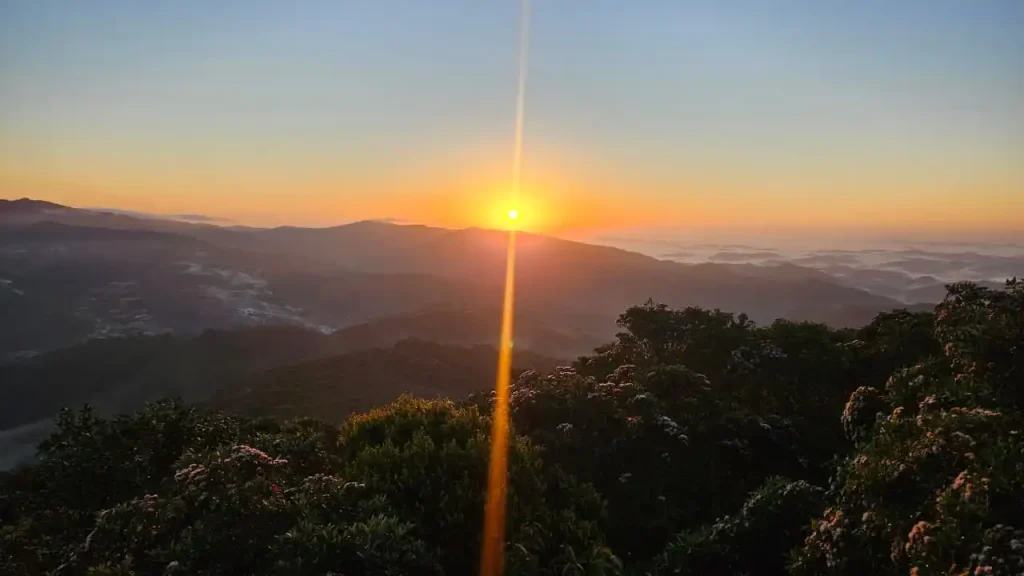
In Ibiti, sunrise is celebrated all year round. The same horizon seen from many places, by many eyes, on different days. For many, it's a habit that never loses its charm. And that's why the scene inspires many clicks made by those who wake up early every morning: the fresh start of a new day. When the community was invited to share images of the sun rising in Ibiti - to illustrate the New Year's Eve celebrations, which were named Ibiti Rise - the response was spontaneous. In a few moments, dozens of photos appeared. Different angles, unique colors, moments captured by each special eye. What unites them all is not the technique, but the feeling, the perception that there, in that first ray of light, there is something that awakens. This multiplicity of views says a lot about the spirit of Ibiti, a place of freedom, where each person experiences nature in their own way, but sharing the same essence. The sunrise, chosen as the symbolic image of Ibiti Rise, translates exactly that: the new year doesn't start with fireworks or excess, but with awareness and presence. See the images sent by Ibiti employees to the Community group at the request of Ibiti News! A New Year's Eve to feel The New Year's program at Ibiti Village, one of the accommodation concepts at Vila Mogol, was designed as a journey connected to nature. Days that invite deceleration, encounter and conscious celebration. Between yoga practices at dawn, a circuit through the waters of Ibitipoca, harvesting in Gaia, farm-to-table lunches, piano concerts and evenings filled with live music, time takes on a different rhythm. A rhythm that respects the body, the landscape and natural cycles. The point of convergence comes on December 31, with the Ibiti Rise New Year's Eve celebration. The planting of peace, the sound healing at dusk and the arrival of night at the Oca create the space for crossing the year with intention. The soundtrack is provided by the band Reggae Feelings, bringing lightness, dance and positive vibes to the new year. Turn the year over like opening a new page The next day, Ibiti invites you to meditate by the water. Everything suggests that the New Year's celebrations become a state that lasts. Just like the sunrise, which doesn't happen suddenly but reveals itself little by little, Ibiti Rise proposes a beginning that matures over time. An invitation to go through the year with more clarity, more connection and more truth. At Ibiti, the new year begins from the inside out. Come and experience Ibiti Rise Reservations Center: (32) 98449-2200
Secrets of the forest: get to know Ibiti's trees and their stories
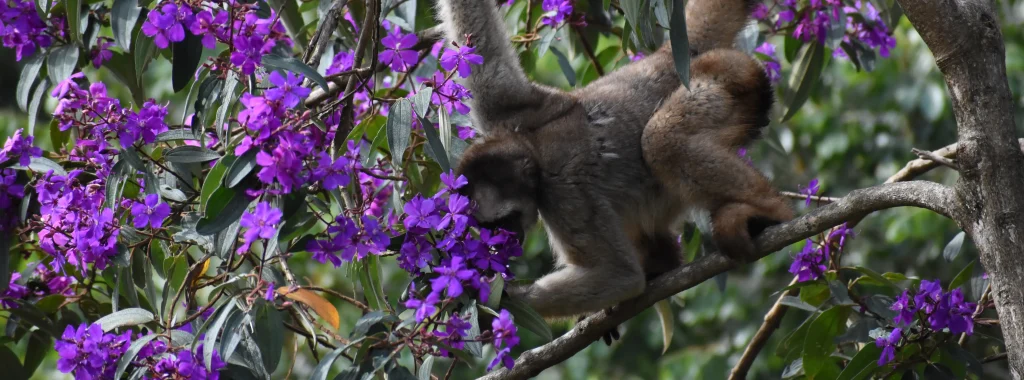
Walking along the Ibiti trails is also a journey through time: each tree tells a story of regeneration, shelter and beauty. Their preservation begins with knowledge and respect for the environment. Ibiti's trees hold legends, meanings and are true guardians of the forest, providing shade, shelter and food for all living beings. And, of course, they are enchanting! Researchers who have been here have catalogued hundreds of species, including ipê-amarelo, quaresmeira, paineira, embaúba, mulungu, candeia, among many others. Many of these trees are marked with plaques, making them easy to recognize during your walk. Others are the protagonists of stories told by guides and local residents. Here are some of the most emblematic trees within the Ibiti Projeto territory, all recorded by the passionate eyes of visitors and project collaborators! Ipê-amarelo Native to South America and very present in Brazil, the ipê-amarelo is celebrated for the exuberance of its flowers which bloom at the end of winter, making it a true national symbol. Between August and September, it colors the forests of Ibiti and enchants visitors. The flowers, considered edible, are used by some chefs in gastronomy. And they attract various insects, bees and birds, especially hummingbirds, which play an essential role in pollination. Quaresmeira An ornamental tree native to Brazil, especially the Atlantic Forest. It usually blooms during the Lenten season, which gives it its popular name, attracting attention in the middle of the forest with its showy purple or pink flowers. Araucaria At the Mirante do Cruzeiro, 42 araucaria saplings have been planted, forming the symbol of peace. This species, which stands out in the landscape on the way to Areião, has existed on the planet for around 200 million years. It flowers between October and December. It produces pine cones that contain the pine nut, which ripens between April and June and serves as food for animals, such as the blue jay, and humans. Jequitibá At Ibiti, two saplings were planted: one at Engenho Lodge and the other at Vila Mogol, in front of the Yucca restaurant. An Atlantic Forest heritage tree, the jequitibá - which can live for more than 500 years - reflects Ibiti Projeto's commitment to longevity and sustainability. It is among the tallest trees in the Brazilian flora, reaching heights of 50 to 60 meters. It provides shelter and food for various species of fauna, which take advantage of its fruit and the protection of its high branches. Mulungu Present in several areas of Ibiti, this tree is endemic to Brazil and is known as much for its medicinal properties as for its beauty. Also called parrot's beak, it is traditionally used as a natural calming agent and can be found in teas, capsules or tinctures. Between June and September, it blooms in vibrant red tones while shedding its leaves, attracting mainly hummingbirds. Sapopema (Tree of the Seven Horsemen) A sapopema tree over 350 years old with a hollow trunk arouses the curiosity of those who pass by on the trail in the middle of the forest near Garnet. Legend has it that, during a heavy storm, seven travelers found shelter inside, arousing curiosity about the thickness of its hollow trunk. Its fruits are woody capsules that open to release winged seeds. Candeia Native to the Cerrado and Rupestrian Fields, the candeia has resistant and aromatic wood, rich in essential oil used in folk medicine and the cosmetics industry. Its white or yellowish flowers bloom between March and May. Juçara The juçara palm is essential for forest regeneration, but is threatened by palm heart extraction. In Ibiti, its fruits are used to produce juçaí (similar to açaí), jellies and ice cream, while the seeds are reintroduced into the wild, encouraging conservation. In Vila Mogol, several seedlings were planted with the involvement of the community, which also takes part in the Juçara Festival. Paineira Among the statues and the Garnet, a majestic specimen of paineira stands out, whose trunk and flowers attract attention in the landscape. It blooms profusely in summer and fall. The fruits are large and, when ripe, release silky millet.
Spinoza's portal: Nature as a temple
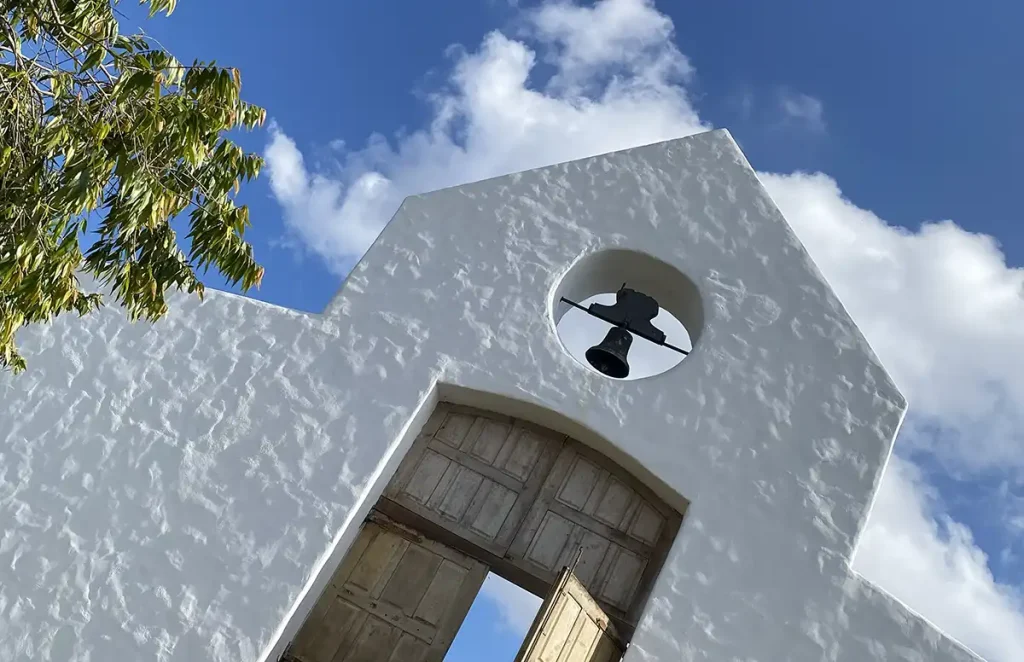
Between philosophy and infinity, a symbol stands out at the top of Ibiti. At the top of Chapadinho at an altitude of 1,200 meters, a white and silent structure invites contemplation. It is the Portal of Spinoza, which combines architecture, philosophy and spirituality in perfect harmony with the landscape. From afar, the façade resembles that of a church. Up close, it reveals a monumental six-meter-high door, acquired more than 20 years ago. The bell rests at the top, completing the scene that unites the sacred and the earthly. The vision behind the Portal The inspiration came from a simple image. Renato Machado, creator of Ibiti Projeto, saw a church façade in the Northeast, remembered the old doors and, as he was reading "Spinoza's Secret", came up with the idea for the building. "You open the portal and see God, because if you can't see God in that wonderful view, you won't find God anywhere," he said, agreeing with the philosopher. Here, the beauty of nature is the very experience of the divine. Harmony and contemplation According to engineer Hugo Cambraia, the portal follows the proportions of the golden ratio, a principle that governs the most harmonious forms found in nature and the arts. It is 16 meters long, 11 meters high and just 1 meter wide, measures that reflect perfect balance and proportion. Made of masonry, the monument fits into the terrain, from where you can see a 360-degree panorama. From there you can see the eastern slope of the Ibitipoca State Park, Areião, Pico do Peão, the Pão de Angu and Cabeça de Formiga hills, the town of Pedro Teixeira and, in the distance, the lights of Juiz de Fora. On clear days, the view reaches as far as Pico da Bandeira, in the Serra do Caparaó. Deus sive Natura The name of the Portal pays homage to Baruch Spinoza (1632-1677), the Dutch philosopher who redefined the notion of God and inaugurated a new form of spirituality. For Spinoza, God and Nature are one and the same reality, an infinite substance that manifests itself in everything that exists. "Everything that exists exists in God, and without God nothing can exist or be conceived," he wrote in his masterpiece, Ethics. Unlike the traditions that place the divine outside the world, Spinoza saw it in every mountain, in every stone, in every thought. Human freedom, he said, lies in understanding the laws of nature and living in harmony with them. For this reason, Spinoza's Portal is more than a viewpoint: it is a symbolic crossing between the rational and the contemplative, between thought and the direct experience of the sacred. A living space The space can host meditations, yoga practices, soundhealing, contemplative breakfasts, meetings and sunrise ceremonies. The place also serves as a backdrop for personalized events, such as celebrations and weddings, where the decoration is nature itself. Find out more ibiti.com @ibitiprojeto @ibiti.village @ibitiengenho
Maned wolf gives birth to two cubs in Ibiti
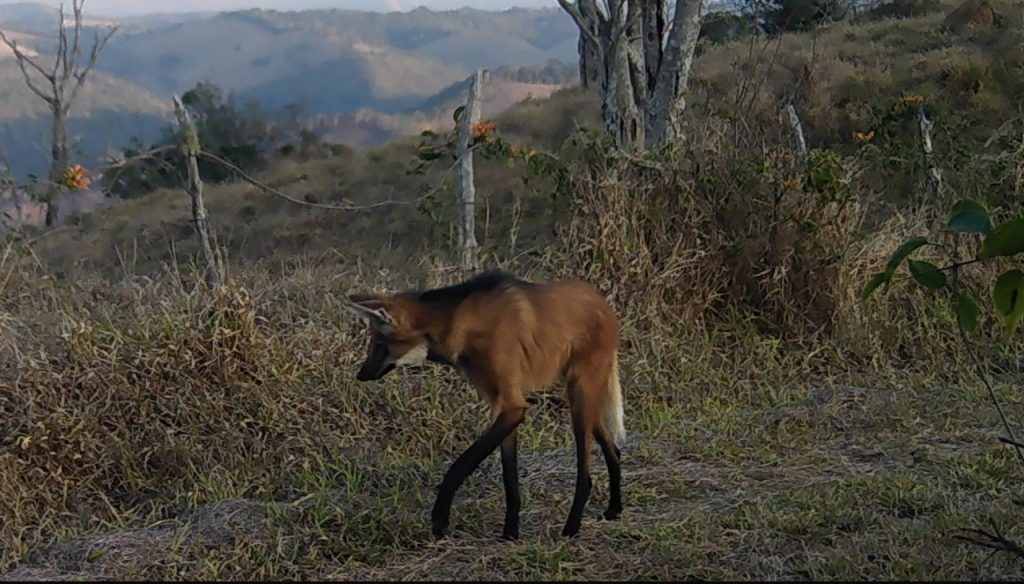
A rare and exciting scene took place in Areião, inside Ibiti: a female maned wolf gave birth to two pups in the wild. The fact, reported by a local resident who spotted the animals, is cause for celebration and reinforces the importance of conservation efforts in protected areas. We still have no records of the cubs. The image illustrating this article was taken by an Ibiti Projeto trap camera, in Areião, at another time. Although it doesn't show the birth, it is a real record of a maned wolf roaming the area. Choosing this regenerating territory as a shelter and nursery is, in itself, a sign of trust. The maned wolf, the symbol species of the Brazilian Cerrado, is considered an indicator of environmental health: it only stays and reproduces in balanced and preserved environments. "It's a gift from nature and a milestone for everyone working to regenerate this ecosystem," says Clariane Maranho, from Ibiti's Regeneration Department. "But it's also a moment that demands attention and respect: because she's with cubs, the female can adopt more protective behavior, which is natural in any species." How to act when you spot a maned wolf An endangered species, the maned wolf plays a vital role in the ecological balance, helping to control populations of small animals and dispersing seeds wherever it goes. Its survival depends directly on the conservation of its habitat and respectful coexistence with humans. May this new generation of wolves remind us once again that caring for nature means caring for the future of us all.
Vacation with children in Ibiti: Fun and connection with nature

Programming includes picnic at the Statues, stargazing, visit to the muriquis and much more